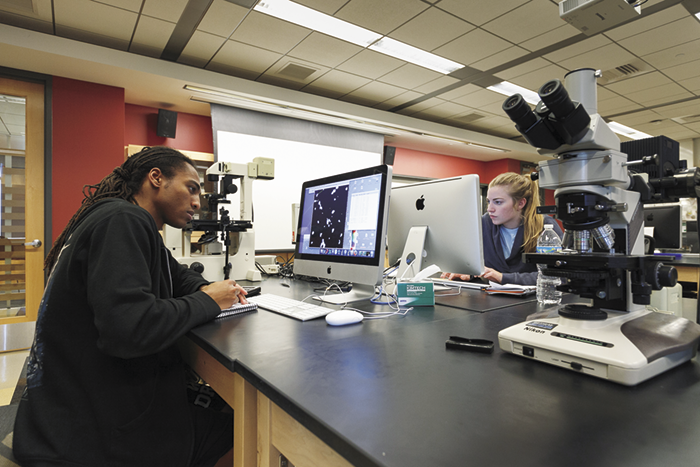The academic experience

When the policymakers and problem solvers of tomorrow look for answers, they’ll be looking squarely at the students of today. Changing political, socioeconomic and cultural landscapes require thinking that can evolve as quickly as the headlines. At Dickinson, students are immersed in a globally focused, broad-based liberal-arts education that keeps them intellectually nimble and ready to rethink the way forward.
Here are some of the ways your academicsupport gifts made a difference during the 2015-16 academic year:
- Innovative, hands-on courses in 43 majors tasked students with writing a grant to make healthy food more affordable, translating vital geological data from Russian to English, using discrete mathematics to crack a safe and much more.
- 4 students earned prestigious National Science Foundation Fellowships
- 58 percent of the class of 2016 studied abroad during their undergraduate years.
- 4 graduating seniors were awarded Fulbrights
- The Institute of International Education (IIE) ranked Dickinson No. 5 for yearlong study abroad
- The Peace Corps ranked Dickinson again among the nation’s top 10 volunteer-producing “small schools” for the fourth straight year.
“Biology has become much more computational,” says Associate Professor of Biology Mike Roberts, whose research focuses on leukemia. “And it’s largely because the techniques that we have now generate really large data sets, which you can’t analyze by inspection.”
Enter Associate Professor of Mathematics Jeff Forrester, whose bioinformatics background brings the computational experience needed to cover the complex bases of the problem. “One of the unique things about this research is that students not only get to collect the data, but they learn how those data are analyzed and how to form mathematical models that help to describe the physical systems,” says Forrester.
“I wanted to come here and do cancer research,” says Abigail Marriott ’16 (biology), “so it’s great to be exposed to all the technology that’s used and be hands-on with it.
”The students are employing that technology to study acute myeloid leukemia (AML), which affects both children and adults and comes with a high mortality rate.
“We’re training students to do science, to think like scientists,” says Roberts, “and that’s best accomplished if they are directly involved in research that they find interesting and important.”
Like Marriott, Sam Eaton ’17 (biochemistry & molecular biology) sees himself as going into oncology, and the research has been a fascinating project. “Working with leukemia or any cancer cell line is very interesting,” he says. “And with research like this, I get to see what goes on behind the scenes of practicing medicine.” Students attended, and gave presentations at, the annual conference of the American Association for Cancer Research, which hosted 18,000 researchers.
“There were maybe 300 undergrads out of the 18,000, so it’s very uncommon to go as an undergraduate,” says Cassie Holbert ’16, whose goal is to become an oncologist. “I’m interested in clinical research, so this project has become even more important in my career plan than I thought it was originally.”
And at its heart, that’s the idea behind this interdisciplinary research.
“We’re trying to create the next generation of cancer researchers,” Forrester says.
“And these things will carry over into graduate school or any related field they enter after they leave Dickinson.”